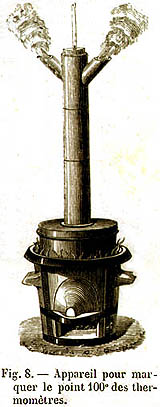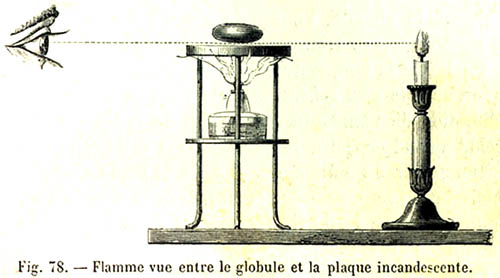Heat in the Shadow of Rouen
Today, heat and cold in Rouen. The University of Houston's College of Engineering presents this series about the machines that make our civilization run, and the people whose ingenuity created them.
A cold rainy day in Rouen, France; we've ducked out of the wet, into a bookstore across the street from Rouen Cathedral. By the time the rain ebbs, I've picked up a fine old book on heat phenomena by Achille Cazin. 1866. Later, I find an American translation, published two years later. But now I hold the lovely French original, as I walk through the Cathedral -- still being restored from WW-II bomb damage.
Cazin wrote the book just as the old caloric theory of heat -- last of the alchemical essences -- was giving way to a new idea. We'd finally realized that heat is not an airy aether flowing from hot bodies to cold ones. Rather, it's the passing on of molecular agitation. Cazin fully understands the new mechanical theory of heat, but he's not about to be tangled in philosophy. He says,
The kind of reasoning adopted by many authors who have written on the mechanical theory of Heat, might lead one to suppose they were the disciples of some peculiar school of Philosophy.

So, don't expect to find the mathematical science of thermodynamics here. He stays in the realm of description as he writes about heat phenomena. And there, he is a master. He explains thermal expansion, melting, freezing, crystallization, every kind of thermometer, prisms, arc-lights, specific heats. He explains steam engines and the embryonic new technology of refrigeration.
Cazin gives remarkably advanced descriptions of atmospheric convection, and the processes that go on when water boils. It is a stunning achievement. None of the old descriptive science books that I've read display such depth.
He finishes with thermal questions about the global climate. Global warming was not yet on his horizon, but he says a lot about long-term matters -- the cooling of Earth's core and thermal results of our slowing rotation about the Sun.
Yet (and here I'm back in Rouen Cathedral) Cazin clearly expresses his French Catholicism. The long-term future of Earth may be too complex to know, right now, but he finishes the book with these words:
[Science] fortifies in our souls the sentiment of adoration for the Divine, and raises us by degrees from the physical to the the moral world. Thus science and religion may truly be called sisters.
The American translator makes science and religion into sister spirits, not just sisters. And there he misses the point by putting both back on a pedestal. Cazin has taken them off that pedestal. Neither science nor religion is a spirit. Nothing spooky here! For him they are both plain contingent facts of daily life.
This clear, straightforward account draws its fine narrative power from that stance. It calls up Wordsworth's wonderful line, For nature then ... To me was all in all. Cazin will no more accept any science/religion conflict than Wordsworth would. Science and religion were -- and they'd better remain -- all of a piece.
I'm John Lienhard, at the University of Houston, where we're interested in the way inventive minds work.
A. Cazin, La Chaleur, Paris: Librairie Hachette et Cie, 1873. (This is actually a third edition of a Cazin's book. The first edition came out in 1866. Since he does not add any updated Prefaces, it is unlikely that he changed much between editions.)
A. Cazin, Phenomena and Laws of Heat. (transl. and ed. By Elihu Rich) New York: Charles Scribner & Co., 1868. The closing words by the translator add a good deal of baggage to Cazin's simpler statement. He writes:
Scientific investigation fortifies within our soul the sentiment of adoration for the Divine Power, and raises us by degrees from the slavery of the physical to the freedom of the moral and spiritual world. Thus science and religion may truly be called sister spirits.

Cazin's description of the way a droplet floats above an incandescent plate and evaporates away very slowly (The so-called Leidenfrost Phenomenon -- or the way a droplet behaves on a red-hot stove.)